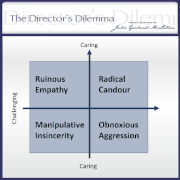|
|
|
|
|
|
|
|
|
Dear reader,
Welcome to the March 2021 edition of The Director's Dilemma. Each month this newsletter looks at a real-life scenario that happened to a board, perhaps to a board like yours, and considers a range of responses. The scenarios are de-identified to protect the individuals concerned.
This month we investigate possible ways forward for a government-owned organisation with an enthusiastic Minister, a huge workload in the statement of expectations, and a limited budget.
I have over twenty-two years' experience consulting to, and serving on, boards. It is a pleasure to share some of it with you in this newsletter and I would be even more delighted to share it with you when your board needs a performance review, strategy workshop, or director education session.
To read this email in a web browser, go to www.mclellan.com.au/newsletter.html and click on 'read the latest issue'. I hope you will enjoy the latest dilemma:

Enya chairs the audit committee of a government owned board. She is always inspired by the mission and loves to see the impact that her company has in the community.
As is common for Australian government-owned companies, her board is established by enabling legislation that restricts the company to work aligned to its core purpose and to delivering the policies of the government of the day. The relevant portfolio Minister issues an annual statement of expectations which provides 'very firm guidance' for what the company should achieve in the following period of operation.
Following a government reshuffle the new Minister has taken a great interest in the company, which does a lot within her electorate. She has visited projects, spoken with staff, and generally supported the company.
The Minister has just sent the new statement of expectations to the chair, who has forwarded it to Enya. Enya was impressed when she read how much the Minister expected the company to achieve. Then she remembered that the annual audit includes a review of performance against the statement of expectations.
Apart from a few small grants that are applied for each year, the company is funded by income from its commercial operations. The surplus is never going to cover the costs of all these projects, even though they are exactly what inspired Enya to join the board in the first place she is daunted at the high risk of failing to meet expectations.
The chair has asked her to reply with comments on the letter of expectations. What should she say?
|
|
|
|
Merv's Answer
 Directors of a public company effectively treat all owners/shareholders the same and make decisions regarding the company that are in the best interests of the company, including all its owners. Directors of a public company effectively treat all owners/shareholders the same and make decisions regarding the company that are in the best interests of the company, including all its owners.
However, with a government-owned company it might be one or only a small number of "owners" who make strategic decisions, often based upon politics, altruism, etc. Multi-year plans, strategic direction and current business operations can all be hampered or overturned by a change in Minister, Mayor or even the Head of Department.
The frustrations of changing plans and priorities can only be overcome through communication. Sometimes that communication can occur before an appointment, but that was obviously not possible in Enya’s case, where the new "owner" has arisen through a reshuffle.
This dilemma might never have arisen if the Chair had been able to meet the new Minister before the latter had time to put pen to paper and developed a new statement of expectations. That would appear to have not been the case, or if it was, then it was obviously unsuccessful. Now as Chair of the Audit Committee, Enya must work with her Chair to sort this out, and non-aggressive and factual communication is the only possibility.
Enya needs to provide the Chair with the details necessary to show how the new Minister’s expectations cannot be fully met due to the financial constraints arising from the company's commercial operations, including which projects would need to be reduced or curtailed. Through everything that Enya does, she must remember that the Board potentially must deal with this Minister for many years and that right now the new Minister will be wanting to see "wins on the board".
Enya’s response to be Chair needs to be factual, realistic and based upon good governance principles, but tempered by her understanding of the Minister’s political drivers.
Merv Jones is Founder and Director at Delaney Jones Gillett & Associates Pty Ltd, Chairman at SciTOX Ltd, and Non-executive Director at Kimbriki Environmental Enterprises Pty Ltd. He is based in Auckland, New Zealand.
|
|
|
|
Julie's Answer
 Enya should be very honest that she feels the letter of expectations contains a workload that is not capable of implementation in the next year without additional funding. Enya should be very honest that she feels the letter of expectations contains a workload that is not capable of implementation in the next year without additional funding.
Enya can help the chair by providing a clear statement of what she believes is achievable and what additional progress might be achieved if additional funds were available.
The Minister should be asked to provide a written directive for areas where the Minister wishes the company to step outside its usual, prudent, operations, and undertake additional work that might cause resourcing difficulties.
Enya should also carefully parse the letter of expectations and work out what is open to interpretation and what is a firm directive. Governments often work on policy outcomes timeframes and these will naturally exceed the annual activity cycle of an operating company. Hopefully the Minister is aware of the areas where the expectations will prove hard to achieve and has worded the letter carefully so that progress towards the outcome is unarguably necessary and achievement of the outcome can follow in later years.
Acceptable progress might be development of a strategy to address the desired actions, or the award of a consulting project to outline how outcomes could be achieved. Community consultation will also be a necessary first step if the actions are outside the usual scope of the business.
Finally, Enya must alert the chair if it appears that a disproportionate amount of the work is falling within the Minister's electorate compared with other areas where the company operates. Being implicated in 'pork barrelling' would be a risk that could harm the reputation of the company and its board members.
Julie Garland McLellan is a non-executive director and board consultant based in Sydney, Australia.
|
|
|
|
Peter's Answer
 There is a lot going on beyond a simple question of how Enya should respond to the Chair; Enya needs to clarify a few things. There is a lot going on beyond a simple question of how Enya should respond to the Chair; Enya needs to clarify a few things.
Starting at the top, Enya needs to ascertain the context surrounding the enhanced statement of expectations. Is it purely political or otherwise? Is it driven from above the Minister or is it a Ministerial idiosyncrasy? Is the Minister under pressure? Why does the Minister have great interest in the company? Can a little research be undertaken to ascertain the context?
Enya also needs to push back on the Chair in two ways. She should encourage the Chair to chat with the Minister and directly seek to clarify the context. At face value there seems to be irrationality in the statement of expectations as you cannot squeeze the lemon beyond a certain point.
Enya should also have a conversation with the Chair. Maybe the Chair has abdicated responsibility and taken the easy way out by simply forwarding the new statement of expectations to Enya and is seeking a "reply with comments". (aka: let me hand you shovel so you can dig the hole) or maybe the Chair seeks Enya's input to be worked into a final (formal) response to the Minister. Either way they need to meet to uncover things like intent, nuance, strategy and horizon thinking.
 Enya should not be "daunted at the high risk of failing to meet (impossible) expectations" but she should be attuned to the motivations of others and the need to manage her personal risk. Enya needs to understand that she is not a magician and cannot make the impossible possible. Enya should not be "daunted at the high risk of failing to meet (impossible) expectations" but she should be attuned to the motivations of others and the need to manage her personal risk. Enya needs to understand that she is not a magician and cannot make the impossible possible.
In terms of response style the radical candour quadrant is instructive. It contains ruinous empathy, manipulative insincerity, obnoxious aggression and radical candour. Enya needs to steer clear of the middle two and focus on a hybrid of empathy (not ruinous) and candour (not too radical) which will deliver a sense of personally caring yet challenging (the underlying irrationality in the statement of expectations) directly.
Peter Tulau is Managing Partner at AltoPartners. He is based in Sydney, Australia.
|
|
|
|
Julie’s News
Do you know where to focus for maximum impact? – boards often struggle to get cut through and drive company performance. They work hard, then they work harder, then call in a consultant who recommends some changes, then they work harder still.
If that sounds like your board, don’t worry. It is likely that you have simply been focusing on the wrong stuff. I have made a diagnostic tool that might help you to prioritise the actions that will free your board from the drudgery and allow you to maximise your impact. You can take the diagnostic here: https://directorsdilemma.scoreapp.com
Call me afterwards for help with revitalising your board.
Book Review – Boards by Patrick Dunne

This book starts with Purpose. This is an area that is increasingly emphasised as one of the most important aspects of a board's role and one that should not be delegated to management or abdicated to shareholders.
The book then considers the human aspect of boards with a section on People. Again, this is an area of current interest and one that has long been acknowledged as key to getting a board to function at peak.
The next section looks at Process and is - perhaps - the area where the book makes the smallest incursion into new and interesting thought for boards. It is still a useful and comprehensive coverage of the key processes that boards need to run effectively.
My favourite section is the final one. It looks at a few real-life dilemmas and consider how boards should respond. The dilemmas in this book are long and well addressed with plenty of nuance and consideration of alternative courses of action.
Overall, this book advances knowledge in several interesting directions and should be on the bookshelf of any director who aspires to be at the leading edge in our profession.
Available at Amazon.com
Inspirational quote for March

I have often noticed that a 'devil's advocate' can help the board to consider risks that were not apparent at first glance. When the board is too quick to unanimously support a course of action it can be helpful to ask "what could go wrong and prevent this plan from succeeding?" or "what unintended adverse consequences might eventuate if this plan is successful?".
Sometimes director dissent adds value!
A note on names - A few readers have asked me where I find the names for the protagonists in each case study; I 'borrow' them from people I meet or things that I read. Enya is an old Irish name; it means 'kernel of a nut or seed'. Our protagonist Enya must be the kernel that generates new ideas and helps her board to drive the massive reform agenda that has inspired her government's new policies.
This newsletter - If you have any ideas for improving the newsletter please let me know. If you are reading a forwarded copy, please visit my website and sign up for your own subscription.
Suggestions for dilemmas - Thank you to all the readers who have suggested dilemmas. They are greatly appreciated. I will answer them all eventually. I could not write this newsletter without your help and without the generous help of all the experts who respond each month to the case studies.
Be a contributor - If you would like to attempt a response to the dilemmas for publication you will be most welcome. Simply reply to this email and let me know.
Let's connect - I use LinkedIn to share information about boards and directorship with my friends and acquaintances. If you use LinkedIn and we are not yet connected I will welcome a connection from you. You can find me at linkedin.com/in/juliegarlandmclellan.
Let me help you - If you would like me to speak to or train your board, staff, audience and/or group please contact me at julie@mclellan.com.au.
Farewell until the next issue due 1 April 2021. I look forward to greeting you again then. In the interim I hope you will enjoy health, happiness and hard work.
Enjoy governing your companies; we are privileged to do what we do and every day is a blessing!
Best regards,
Julie

Main Photo by Andrea Piacquadio from Pexels
Photo Credits: Personal images in this newsletter are provided courtesy of the contributors, course attendees and conference participants.
Disclaimer:
The opinions expressed above are general in nature and are designed to help you to develop your judgement as a director. They are not a definitive legal ruling and do not constitute legal advice. Names and some circumstances in the case study have been changed to ensure anonymity. Contributors to this newsletter comment in the context of their own jurisdiction; readers should check their local laws and regulations as they may be very different.
Privacy: I am privileged to have your contact details and keep them as safely as possible. I will alert you if they are ever accessed by any unauthorised person (the technical staff at ayuda help with publishing and issuing the Director's Dilemma and have access so they can send the newsletters to you). I do not sell your details to anyone; they are kept only for the intended purpose - sending you this newsletter and helping to build the judgement of company directors by providing a safe way to consider potential responses to real life events.
|
|
|
|
|
|
|


 Directors of a public company effectively treat all owners/shareholders the same and make decisions regarding the company that are in the best interests of the company, including all its owners.
Directors of a public company effectively treat all owners/shareholders the same and make decisions regarding the company that are in the best interests of the company, including all its owners. Enya should be very honest that she feels the letter of expectations contains a workload that is not capable of implementation in the next year without additional funding.
Enya should be very honest that she feels the letter of expectations contains a workload that is not capable of implementation in the next year without additional funding. There is a lot going on beyond a simple question of how Enya should respond to the Chair; Enya needs to clarify a few things.
There is a lot going on beyond a simple question of how Enya should respond to the Chair; Enya needs to clarify a few things. Enya should not be "daunted at the high risk of failing to meet (impossible) expectations" but she should be attuned to the motivations of others and the need to manage her personal risk. Enya needs to understand that she is not a magician and cannot make the impossible possible.
Enya should not be "daunted at the high risk of failing to meet (impossible) expectations" but she should be attuned to the motivations of others and the need to manage her personal risk. Enya needs to understand that she is not a magician and cannot make the impossible possible.

